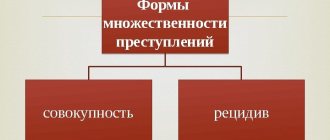ST 68 of the Criminal Code of the Russian Federation.
1. When assigning punishment for a recidivism, dangerous recidivism or especially dangerous recidivism of crimes, the nature and degree of public danger of previously committed crimes, the circumstances due to which the corrective effect of the previous punishment turned out to be insufficient, as well as the nature and degree of public danger of newly committed crimes are taken into account.
2. The term of punishment for any type of recidivism of crimes cannot be less than one third of the maximum term of the most severe type of punishment provided for the crime committed, but within the sanction of the relevant article of the Special Part of this Code.
3. In case of any type of recidivism of crimes, if the court has established mitigating circumstances provided for in Article 61 of this Code, the term of punishment may be assigned less than one third of the maximum term of the most severe type of punishment provided for the crime committed, but within the sanction of the relevant article of the Special Part of this Code Code, and in the presence of exceptional circumstances provided for in Article 64 of this Code, a more lenient punishment than provided for this crime may be imposed.
Commentary to Art. 68 Criminal Code
1. Intensification of punishment in case of recidivism of crimes is as follows: in case of any type of recidivism of crimes, the court is obliged to increase the lower limit of the main type of punishment provided for in the sanction of the article of the Special Part of the Criminal Code to one third of its upper limit and be guided by these limits when assigning punishment. For example, the sanction of Part 2 of Art. 282 of the Criminal Code of the Russian Federation provides for punishment in the form of imprisonment from two months to 5 years. In case of recidivism of crimes, the imposed punishment cannot be less than 1 year and 8 months of imprisonment.
2. If, when calculating one third, a lower limit is obtained that is lower than that provided for in the sanction of the article, then the court will be guided by the term (size) of the punishment established by the sanction of the article, and not the received lower limit. For example, Art. 275 of the Criminal Code provides for a sanction of 12 to 20 years in prison; one third is 6 years and 8 months, in which case the court is obliged to impose a sentence ranging from 12 to 20 years.
3. In the alternative sanctions of the articles of the Special Part of the Criminal Code, the rule for imposing punishment for recidivism of crimes requires the court to choose the most severe of the provided types of punishment. In sanctions with additional types of punishment, the lower limit of the additional type of punishment should not be increased by one third.
4. If mitigating circumstances are established (Part 1 of Article 61 of the Criminal Code of the Russian Federation), then the court may not apply the rule of Part 2 of Art. 68 of the Criminal Code and impose punishment within the limits established by the sanction of the article.
If exceptional mitigating circumstances are established, then the court is obliged not to comply with the requirements of Part 2 of Art. 68 of the Criminal Code and can mitigate the punishment according to the rules of Art. 64 of the Criminal Code.
Legal signs of relapse
Recidivism (Latin: “returning”) of crimes is one of the basic concepts that exists in the theory of criminal law. Its importance cannot be underestimated, since it will determine how much time they will be given and what places of detention they will be sent to.
The features of such a term should also be considered together:
- subject - in addition to the basic definitions, this person must have a criminal record.
- the subjective side requires the presence of intent. A careless act excludes this factor;
- object – there are no special features for this category.
- the objective side - the action taken must be socially dangerous, cause harm and have a cause-and-effect relationship between these two characteristics.
The sentencing for repeated crimes is more severe, since it is considered a circumstance that aggravates the guilt of the defendant. It also affects the type of correctional facility.
Second commentary to Art. 68 of the Criminal Code of the Russian Federation
1. Recidivism of crimes, in accordance with Part 1 of Art. 18 of the Criminal Code, occurs when an intentional crime is committed by a person who has a criminal record for a previously committed intentional crime. The repetition of criminal behavior by a person to whom the sanctions of the criminal law have already been applied shows, as a rule, that the previous punishment did not achieve its goals and in order for the new criminal legal impact on him to be more effective, a more severe punishment is required compared to that , which could be applied to a person who has not previously committed a crime.
2. The court is obliged to make sure that there is a relapse in this case: the person’s previous convictions were not legally vacated or expunged; convictions for crimes committed by a person under the age of eighteen were not taken into account when recognizing a recidivism. As for the stages of crimes committed by a person, as well as his role in group crimes for which he was previously prosecuted, these issues do not affect the fact of recognition of recidivism (clause 46 of the 2015 PPVS).
3. The presence of a conviction for a crime of minor gravity in a person who has committed a serious crime does not constitute a recidivism of crimes. However, the commission of an intentional crime of minor gravity by a person who has a conviction for a crime of medium gravity, a serious or especially serious crime constitutes a recidivism of crimes.
Removed, including in the manner established by Part 1 of Art. 74 of the Criminal Code, or a criminal record expunged before the commission of a new crime does not constitute a recidivism. However, the presence of a criminal record (with the exception of convictions listed in Part 4 of Article 18 of the Criminal Code), removed or expunged after the commission of a new crime in the manner established by Art. 86 of the Criminal Code, forms a relapse of crimes, since the presence of a relapse of crimes is established at the time of the commission of the crime (clause 44 of the 2015 PPVS).
4. In accordance with Part 1 of Art. 68 of the Criminal Code, when assigning punishment for a recidivism, dangerous recidivism or especially dangerous recidivism of crimes, the nature and degree of public danger of previously committed crimes, the circumstances due to which the corrective effect of the previous punishment turned out to be insufficient, as well as the nature and degree of public danger of newly committed crimes are taken into account.
5. The rule for increasing punishment in case of recidivism is that:
1) only the most severe type of punishment from among those provided for by the sanction can be imposed;
2) the law (Part 2 of Article 67 of the Criminal Code) establishes its minimum limit.
The term of punishment for any type of recidivism of crimes cannot be less than one third of the maximum term of the most severe type of punishment provided for the crime committed, but within the sanction of the relevant article of the Special Part of the Criminal Code.
6. However, from the above rule, the legislator (Part 3 of Article 68 of the Criminal Code) makes two exceptions that allow the court to overcome the limitation of the minimum punishment by one third of the most severe punishment:
1) if the court has established mitigating circumstances provided for in Art. 61 of the Criminal Code, the term of punishment may be assigned less than one third of the maximum term of the most severe type of punishment provided for the crime committed, but within the sanction of the relevant article of the Special Part of the Criminal Code;
2) in the presence of exceptional circumstances provided for in Art. 64 of the Criminal Code, a more lenient punishment may be imposed than provided for this crime. The court must motivate its decision not to apply the rules of Part 2 of Art. 68 of the Criminal Code in the descriptive part of the verdict.
7. Based on the provisions of parts 2 and 3 of Art. 68 of the Criminal Code, punishment for recidivism of crimes cannot be lower than the lower limit of the sanction of the corresponding article, even if one third of the maximum term of the most severe type of punishment provided for a completed crime is less than the minimum amount of the most severe type of punishment provided for a specific crime (for example, for a crime under Part 3 of Article 161 of the Criminal Code, taking into account the provisions of Part 2 of Article 68 of the Criminal Code, less than 6 years of imprisonment cannot be imposed - the lowest limit of this type of punishment for this crime, although one third of the maximum punishment for this crime is 4 years).
Courts should keep in mind that in case of any type of recidivism of crimes, the sentence for an unfinished crime may be lower than the lower limit of the sanction of the corresponding article of the Special Part of the Criminal Code. At the same time, the reference to Art. 64 of the Criminal Code is not required.
In the case where one third exceeds the minimum amount of the most severe type of punishment provided for the crime committed, the court, in accordance with Part 3 of Art. 68 of the Criminal Code may impose a punishment for a period of less than one third, but not lower than the lower limit of the sanction of the corresponding article of the Special Part of the Criminal Code, if it establishes mitigating circumstances provided for in Art. 61 CC. At the same time, circumstances recognized as such in accordance with Part 2 of Art. 61 CC.
If the size of one third of the maximum term of the most severe type of punishment coincides with the lower limit of the sanction of the corresponding article and the court has established mitigating circumstances provided for in Art. 61 of the Criminal Code, and the grounds for applying Art. 64 of the Criminal Code are not established, the court does not have the right to assign a sentence to a convicted person below the lower limit of the sanction of the relevant article (clause 48 of the PPVS 2015).
8. In the case of consideration of a criminal case in a special manner, in accordance with Chapter. 40 or 40.1 of the Code of Criminal Procedure, for any type of relapse provided for in parts 2 and 3 of Art. 68 of the Criminal Code one third is calculated:
1) for a completed crime - from the maximum term of the most severe type of punishment provided for the crime committed by the sanction of the relevant article;
2) for an unfinished crime - from the maximum term of the most severe type of punishment provided for the committed crime, which can be assigned taking into account the provisions of Art. 66 of the Criminal Code (clause 49 of the PPVS 2015).
Recidivism law
The Criminal Code contains several articles whose content is devoted to recidivism. The basis of the concept itself is revealed by Article 18 of the Criminal Code of the Russian Federation.
According to this normative act, recidivism is considered an act committed by a person intentionally, provided that this person already has a criminal record for the same or similar crime.
The document contains quite a lot of reservations that make it clear that recidivism is not just the repeated commission of crimes by the same person. In order for an act to be qualified as a recidivism, it must meet the following categories:
- for previous violations of the law, the perpetrator was assigned real responsibility, which he was obliged to serve, that is, with a suspended sentence and a deferment of the sentence, a relapse cannot occur;
- the criminal record of the perpetrator is still valid . If the criminal record at the time of committing a repeated crime had already expired or was expunged early, the crime will not be considered a relapse;
- Only an adult citizen can be a repeat offender . All violations committed by a person before reaching the age of majority will not be counted in the calculation;
- a crime can only be intentional . For violations due to negligence, a citizen cannot be declared a repeat offender. In this case, it does not matter how serious the crime was;
- Only repeatedly committed crimes that do not fall into the category of minor gravity can be recognized as a recidivism. A repeat offender can only be punished for more serious illegal acts.
Third commentary to Article 68 of the Criminal Code of the Russian Federation
1. The commented article reveals the procedure for assigning punishment in case of relapse, dangerous relapse and especially dangerous recidivism (the concept of these types of relapse is given in Article 18 of the Criminal Code), and also lists (in part 1) the circumstances that should be taken into account when assigning punishment in case of relapse.
2. The presence of any type of recidivism in accordance with the principle of justice (Article 6 of the Criminal Code) entails increased punishment in the form of increasing the minimum limit of the imposed punishment: the term of punishment cannot be less than one third of the term of the most severe type of punishment provided for the crime committed. If one third is less than the minimum amount of the most severe type of punishment provided for a specific crime, then the punishment must be imposed not lower than the minimum amount of this type of punishment provided for by the General Part of the Criminal Code. If the crime committed is unfinished, then in the event of a relapse, when determining the maximum term of the most severe punishment, one should proceed from the maximum term of punishment that can be assigned taking into account the requirements of Article 66 of the Criminal Code.
3. The reform of criminal legislation in 2003 strengthened the humanistic principles of criminal legislation. Part 3 of the commented article establishes special circumstances, according to which for any type of recidivism of crimes, a punishment of less than one third of the maximum amount can be imposed. This is possible if mitigating circumstances are established. Moreover, the presence of exceptional circumstances gives the court the right to impose a sentence below the lower limit. This decision of the legislator, in our opinion, does not fully comply with the principles of fairness and differentiation of responsibility.
4. If a person is found guilty of committing several crimes for any type of recidivism, the punishment for each of them must be imposed based on the rules established by the commented article, and for a set of crimes or a set of sentences - in accordance with Article 69 or Article 70 of the Criminal Code.
‹ Article 67. Imposition of punishment for a crime committed in complicityUp Article 69. Imposition of punishment for a combination of crimes ›
What is a relapse
As part of the Russian language, the concept of “relapse” appeared from Latin. Recicdivus - this is how the definition of “repetitive” sounded in the ancient language. In the modern Russian language and, in particular, in the vocabulary of criminal law, this word implies the repeated commission of a crime by the same person who has previously received a criminal record.
The presence of a repeated violation of the law radically changes the punishment applied to the offender, implying a much harsher form of responsibility. Recidivism affects the place of serving the sentence to which the offender will be sent.
Thus, people who have “rich experience” in committing crimes are often placed in colonies with strict regulations and a special regime. While citizens who have committed a crime for the first time are usually assigned to places with relatively mild conditions of stay. What can be transferred to a pre-trial detention center and in what ways to register it, read the article at the link.
Prescription of punishment for the accumulation and recidivism of crimes
A set of crimes is the commission of several illegal acts. As a rule, the investigator or inquiry officer distinguishes one criminal case from another and establishes the composition separately from the previous crime.
When criminal cases are sent to court, the outstanding criminal record will be applied in both cases, and the judge will impose a punishment based on the totality of crimes. In some cases, if a person has not served a sentence, but has committed a new one, the court has the right to assign punishments by addition and come to a common denominator.
It should be noted that if a relapse is confirmed, the judge will aggravate the situation of the accused and impose a strict punishment.




